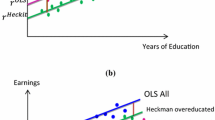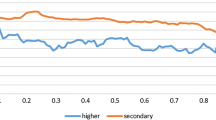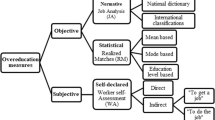Abstract
We deploy the unique opportunity of a dataset of Flemish school leavers to measure the incidence of over- and undereducation on the basis of the six applied measures in the literature. The incidence of overeducation in the first job after leaving school ranges from only 8% to 51%, undereducation ranges from 3% to 21%. While 66% is overeducated on the basis of at least one measure, only 3% is overeducated on the basis of every measure. Mismatch correlations range from 5% to 82%. Also the categories in terms of gender, educational level and region of residence with the highest likelihood of being overeducated depend on the measure. These findings clearly underline the weakness of the literature on this subject. However, measuring overeducation in different ways enables to derive some alternative concepts. Genuine overeducation amounts to about 20%. The incidence of over- and undereducation is both attributed to qualification inflation and deflation, and a credential gap. Finally, about 80% of the incidence of overeducation is classified as being structural.
Similar content being viewed by others
References
J. Allen R. Velden Particlevan der (2001) ArticleTitleEducational mismatches versus skill mismatches: effects on wages, job satisfaction, and on-the-job search Oxford Economic Papers 53 IssueID3 434–452 Occurrence Handle10.1093/oep/53.3.434
H. Battu C. Belfield P. Sloane (2000) ArticleTitleHow well can we measure graduate overeducation and its effects? National Institute Economic Review, No. 171 January 82–93
Becker, G. (1957). The Economics of Discrimination. University of Chicago Press, 137 pp.
L. Borghans A. Grip Particlede (2000) The debate in economics about skill utilization L. Borghans A. Grip Particlede (Eds) The Overeducated Worker? Edward Elgar Cheltenham 3–23
F. Büchel M. Ham Particlevan (2003) ArticleTitleOvereducation, regional labor markets, and spatial flexibility Journal of Urban Economics 53 482–493 Occurrence Handle10.1016/S0094-1190(03)00008-1
K. Burdett (1978) ArticleTitleA theory of employee job search and quit rates American Economic Review 68 IssueID1 212–220
V. Burris (1983) ArticleTitleThe social and political consequences of overeducation American Sociological Review 48 454–467 Occurrence Handle10.2307/2117714
CBS (2001). Standaard beroepenclassificatie 1992 – editie 2001.
Chevalier (2003) ArticleTitleMeasuring Over-education Economica 70 IssueID3 509–531 Occurrence Handle10.1111/1468-0335.t01-1-00296
A. Clark (1997) ArticleTitleJob satisfaction and gender: why are women so happy at work? Labour Economics 4 341–372 Occurrence Handle10.1016/S0927-5371(97)00010-9
C. Clogg J. Shockey (1984) ArticleTitleMismatch between occupation and schooling: a prevalence measure, recent trends and demographic analysis Demography 21 235–257
E. Cohn S. Khan (1995) ArticleTitleThe wage effects of overschooling revisited Labour Economics 2 IssueID1 67–76 Occurrence Handle10.1016/0927-5371(95)80008-L
Dolton, P. and Silles, M. (2001). Over-education in the graduate labour market: some evidence from alumni data. CEE Discussion Paper, June 2001, 40 pp.
R. Eckhaus (1964) ArticleTitleEconomic criteria for education and training Review of Economics and Statistics 46 181–190 Occurrence Handle10.2307/1928184
R. Frank (1978) ArticleTitleWhy women earn less: the theory and estimation of differential overqualification American Economic Review 68 IssueID3 360–373
J. F. Giret C. Hatot (2001) ArticleTitleMesurer le déclassement à l’embauche: l’exemple de DUT et de BTS Formation Emploi 76 59–73
Green, F., McIntosh, S. and Vignoles, A. (1999). Overeducation and skills – clarifying the concepts. CEP Discussion Paper, No. 435.
S. Groeneveld (1997) ArticleTitlePassend meten, over definities en metingen van overscholing Tijdschrift voor Arbeidsvraagstukken 13 IssueID3 273–282
W. Groot (1996) ArticleTitleThe incidence of, and returns to overeducation in the UK Applied Economics 28 IssueID10 1345–1350 Occurrence Handle10.1080/000368496327895
W. Groot H. Maassenvanden Brink (1996) ArticleTitleOverscholing en verdringing op de arbeidsmarkt Economisch Statistische Berichten 4042 74–77
W. Groot H. Maassenvanden Brink (2000a) ArticleTitleOvereducation in the labor market: a meta-analysis Economics of Education Review 19 IssueID2 149–158 Occurrence Handle10.1016/S0272-7757(99)00057-6
W. Groot H. Maassenvanden Brink (2000b) ArticleTitleSkill mismatches in the Dutch labor market International Journal of Manpower 21 IssueID8 584–595 Occurrence Handle10.1108/01437720010379493
C. Halaby (1994) ArticleTitleOvereducation and skill mismatch Sociology of Education 67 IssueID1 47–59 Occurrence Handle10.2307/2112749
J. Hartog (2000) ArticleTitleOvereducation and earnings: where are we, where should we go? Economics of Education Review 19 IssueID2 131–147 Occurrence Handle10.1016/S0272-7757(99)00050-3
B. Jovanovic (1979) ArticleTitleJob matching and the theory of turnover Journal of Political Economy 87 IssueID5 972–990 Occurrence Handle10.1086/260808
B. Kiker M. Santos M. Mendesde Oliveira (1997) ArticleTitleOvereducation and Undereducation: Evidence for Portugal Economics of Education Review 16 IssueID2 111–125 Occurrence Handle10.1016/S0272-7757(96)00040-4
D. Livingstone (1999) ArticleTitleLifelong learning and underemployment in the knowledge society: a North American perspective Comparative Education 35 IssueID2 163–186 Occurrence Handle10.1080/03050069927955
Y. Ng (2001) ArticleTitleOvereducation and undereducation and their effect on earnings: evidence from Hong Kong 1986–1996 Pacific Economic Review 6 IssueID33 401–418 Occurrence Handle10.1111/1468-0106.00141
E. Phelps (1972) ArticleTitleThe statistical theory of racism and sexism American Economic Review 62 IssueID4 659–661
Pollet, I., Van Hootegem, G. and Van Meensel, R. (1999). Het verdrongen land. De arbeidsmarkt in Vlaanderen, Jaarboek 1999, Steunpunt WAV, Leuven, 277–309.
G. Renes G. Ridder (1995) ArticleTitleAre women overqualified? Labour Economics 2 3–18 Occurrence Handle10.1016/0927-5371(95)80003-G
J. Robst (1995) ArticleTitleCollege quality and overeducation Economics of Education Review 14 IssueID3 221–228 Occurrence Handle10.1016/0272-7757(94)00054-A
S. Rubb (2003) ArticleTitleOvereducation in the labor market: a comment and re-analysis of a meta-analysis Economics of Education Review 22 IssueID6 621–629 Occurrence Handle10.1016/S0272-7757(02)00077-8
R. Rumberger (1987) ArticleTitleThe impact of surplus schooling on productivity and earnings Journal of Human Resources 22 IssueID1 24–50 Occurrence Handle10.2307/145865
J. Scoville (1966) ArticleTitleEducation and training requirements for occupations Review of Economics and Statistics 48 397–94 Occurrence Handle10.2307/1924616
P. Sloane H. Battu P. Seaman (1996) ArticleTitleOvereducation and the formal education/experience and training trade-off Applied Economics Letters 3 511–515 Occurrence Handle10.1080/135048596356131
SONAR (2003). Hoe maken Vlaamse jongeren de overgang van school naar werk?, basisrapportering cohorte 1978 (eerste golf), 147 pp.
L. Thurow (1975) Generating Inequality Basic Books New York
R. Velden ParticleVan der M. Smoorenburg Particlevan (1999) ArticleTitleOverscholing en beloning: Het effect van verschillende meetmethoden Tijdschrift voor Arbeidsvraagstukken 15 IssueID2 111–123
R. Verdugo N. Verdugo (1989) ArticleTitleThe impact of surplus schooling on earnings Journal of Human Resources 22 IssueID4 690–695
D. Verhaest E. Omey (2003) ArticleTitleOvereducation in the transition from school to work: the case of Flanders The Netherlands’ Journal of Social Sciences 39 IssueID3 202–226
Verhaest, D. and Omey, E. (2004). What determines measured overeducation? FEB Working Paper, No. 04/215, Ghent University, 31 pp.
Verhaest, D. and Omey, E. (2005). The impact of overeducation and its measurement. Social Indicators Research, forthcoming.
Author information
Authors and Affiliations
Corresponding author
Rights and permissions
About this article
Cite this article
Verhaest, D., Omey, E. Measuring the Incidence of Over- and Undereducation. Qual Quant 40, 783–803 (2006). https://doi.org/10.1007/s11135-005-3955-3
Issue Date:
DOI: https://doi.org/10.1007/s11135-005-3955-3




